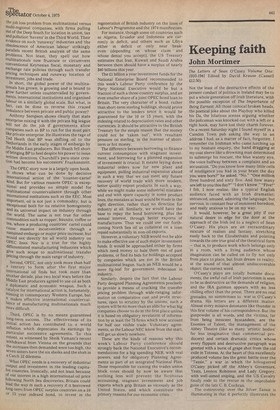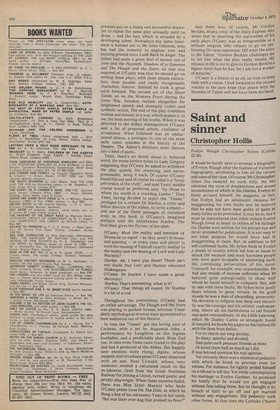Keeping faith
John Mortimer
The Letters of Sean O'Casey Volume One: 1910-1941 Edited by David Krause (Cassell E12.50) Not the least of the destructive effects of the present conduct of politics in Ireland may be to put a Whole generation off Irish literature, with the possible exception of The Importance of Being Earnest. All those comical broken heads, the poetical joke about the Playboy who killed his Da, the hilarious scenes arguing whether the policeman was knocked out with a left or a right hook, may have lost their charm forever. On a recent Saturday night I found myself in a Camden Town pub asking the way to an address I had, as a matter of fact, forgotten. I remember the Irishman who came lurching up to my hesitant enquiry, the hand dragging at my coat sleeve like a drowning man determined to submerge his rescuer, the blue watery eye, the voice halfway between a complaint and an accusation. "Do you know how many little cells of intelligence you had in your brain the day you were born?" he asked. "No." "One million three hundred and sixty five. And how many are left to you this day?" "I don't know." "Five!" I felt, I now realise,, like a typical English audience faced with an Irish dramatist; entranced, amused, admiring the language; but nervous, in constant fear of imminent boredom, and really anxious to be on my way.
It would, however, be a great pity if our natural desire to edge for the door at the approach of the Irish led to a neglect of Sean O'Casey. His plays are an extraordinary mixture of realism and fantasy, stretching easily back to the Elizabethans and pointing towards the one true goal of the theatrical form — that is, to produce work which belongs only in a room, with a living audience whose imagination can be called on to fly not only from place to place, but from dream to reality, at the sound of that almost undiscoverable object: the correct word.
O'Casey's plays are totally humane documents; the awful call of Irish patriotism is seen to be as destructive as the demands of religion, and the IRA gunman appears with no less chilling effect than the priest. There are no real grenades, no summonses to war in O'Casey's drama. His letters are a different matter. Almost every missive detonates like thunder in this first volume of his correspondence. But the 'gunpowder is all words, and the victims, far from being innocent bystanders, are the Enemies of Talent, the management of the Abbey Theatre (like so many 'artistic bodies' far less imaginative than commercial pro ducers) and certain dramatic critics whose every flippant and destructive paragraph was greeted with a burst of grape shot from the old exile in Totness. At the heart of this excellently produced volume lies the great battle over the "Tassie," a war in which the beleaguered O'Casey picked off the Abbey's Governor, Yeats, Lennox Robinson and Lady Gregory, with well-aimed sniping, and the US Cavalry finally rode to the rescue in the improbable guise of the late C. B. Cochran.
The controversy over the Silver Tassie is illuminating in that it perfectly illustrates the
pressure put on a rising and successful dramatist to repeat the same play annually until he drops and the fury which is aroused by a developing talent. Nowadays the same treatment is handed out to Mr John Osborne, who has had the temerity to explore new and exciting ground since Look Bach In Anger. The Abbey had made a great deal of money out of Juno and the Paycoch, Shadow of a Gunman and The Plough and the Stars; all that was required of O'Casey was that he should go on writing these plays, with their simple naturalism, their lovable and easily recognisable characters, forever. Instead he took a great lurch forward. The second act of the Silver Tassie, set on the Western Front during the Great War, forsakes realism altogether for heightened speech and strangely comic and symbolic action. The end of the play combines realism and fantasy in a way which makes it, to me, the most moving of his works. When it was delivered to the Abbey management O'Casey sent a list of proposed actors, confident of acceptance. What followed was an embarrassed silence, a prologue to one of the most sadly comic episodes in the history of the Theatre. The Abbey's directors were thrown into a kind of panic.
Yeats, there's no doubt about it, behaved worst. He wrote furtive notes to Lady Gregory suggesting that O'Casey be asked to withdraw the play quietly for rewriting and never, presumably, bring it back. Of course O'Casey found this out and of course he called it a "lousy perversion of the truth", and said Yeats' middle course would be preferred only "by those to whom the world is a crawling Limbo." Then Yeats, having decided to reject the "Tassie," arranged for a certain Dr Starkie, a critic and fellow director of the Abbey, to write a report and one of the finest passages of sustained irony in this book is O'Casey's imagined dialogue with the unfortunate Starkie. The final blast gives the flavour of the titan: O'Casey: Must the reality and emotion of Drama be co-equal as they aren't in music and painting at every time and place? Is even the musing of Falstaff exactly similar to the reality and the musing of Lord and Lady Macbeth?
Starkie: Ah, I have you there! There isn't any doubt that Lear and Hamlet educated Shakespeare.
O'Casey: Dr Starkie, I have made a great discovery!
Starkie: That's interesting; what is it? O'Casey: That thingsall round, Dr Starkie is a bit of a cod.
Throughout the controversy O'Casey had an unfair advantage. The Plough and the Stars was playing to packed houses whereas Yeats' dimly mythological dramas were guaranteed to bore audiences out of the theatre.
In time the "Tassie" got the loving care of Cochran, with a set by Augustus John, a performance by Laughton as the legless footballer, and a predictably short West End run. In time even Yeats came round to the play and had it produced at the Abbey. But happily new enemies were rising; Agate, whose waspish and circuitous prose O'Casey dissected with an axe, Noel Coward, whose very existence seemed a calculated insult to the ex-labourer, fired from the Great Northern Railway for joining a Union, turned poetic and prickly playwright. When these enemies failed, there was Miss Ethel Mannin who bade O'Casey praise Love On The Dole, at which he flung a line of his old enemy Yeats in her teeth, "But was there ever dog that praised its fleas?"
And there was, of course, Mr Gordon Beckles, drama critic of the Daily Express who wrote that in deserting the naturalism of his early plays O'Casey was as irresponsible as a brilliant surgeon who refuses to go on performing the same operation. Off went the salvo to the Editor, "Gordon Beckles challenges me to tell him what the play really means. MY mission in life is not to give to Gordon Beckles a higher mind than he has, for I am not a worker of miracles."
O'Casey is a lesson to us all, on how to keep faith with a vision. I look forward to the second volume in the sure hope that peace with the Enemies of Talent will not have been declared.



































 Previous page
Previous page